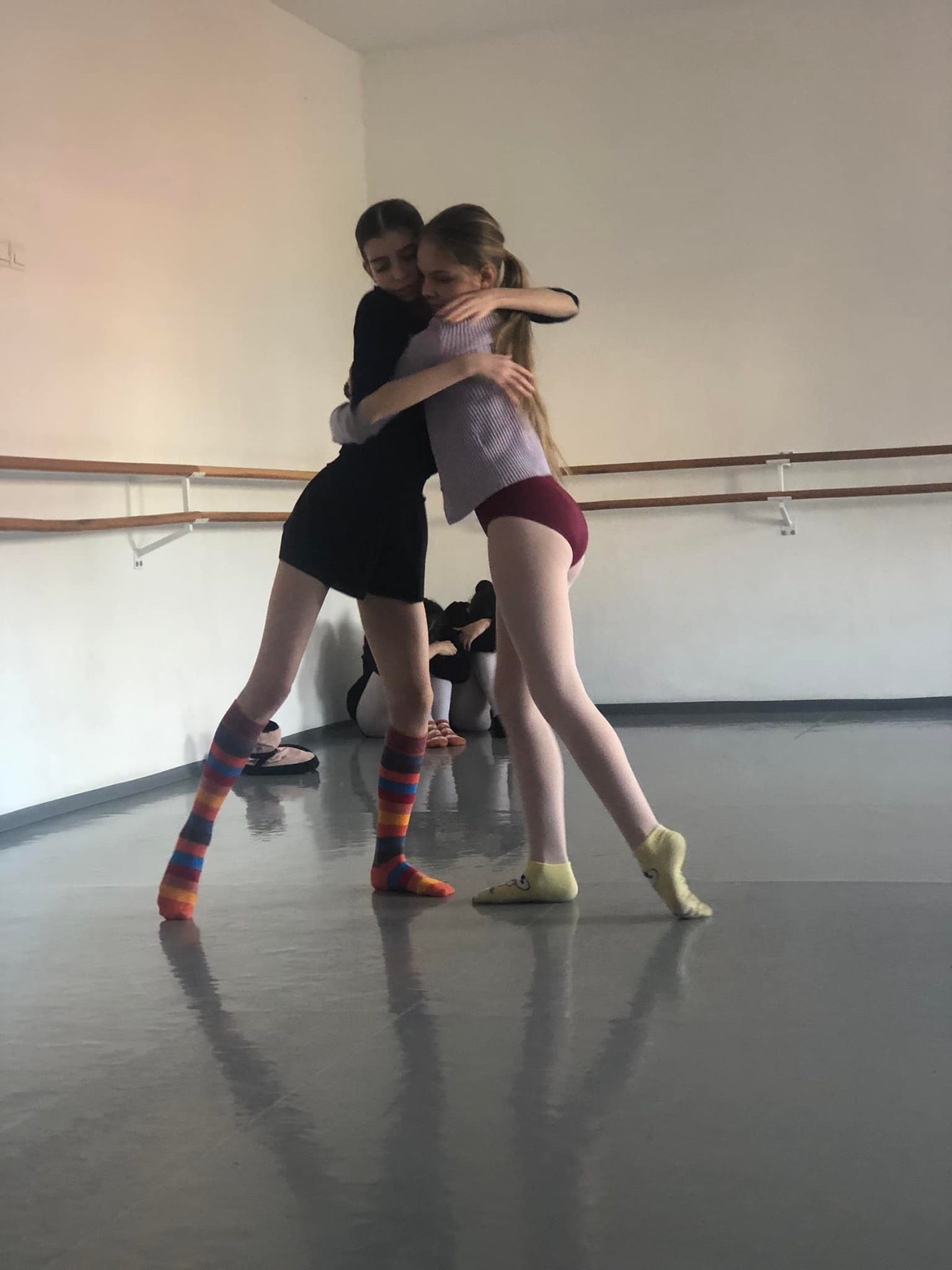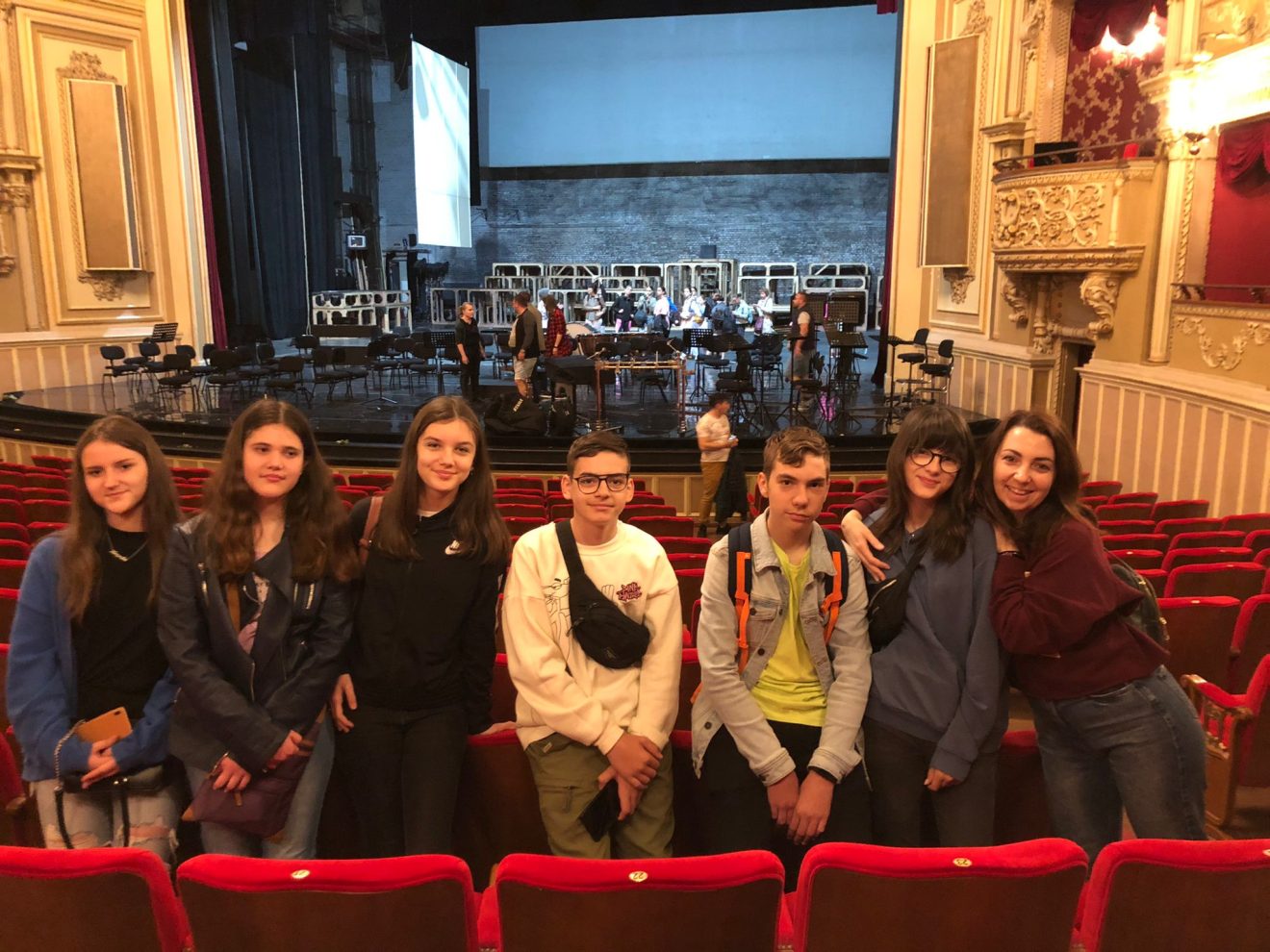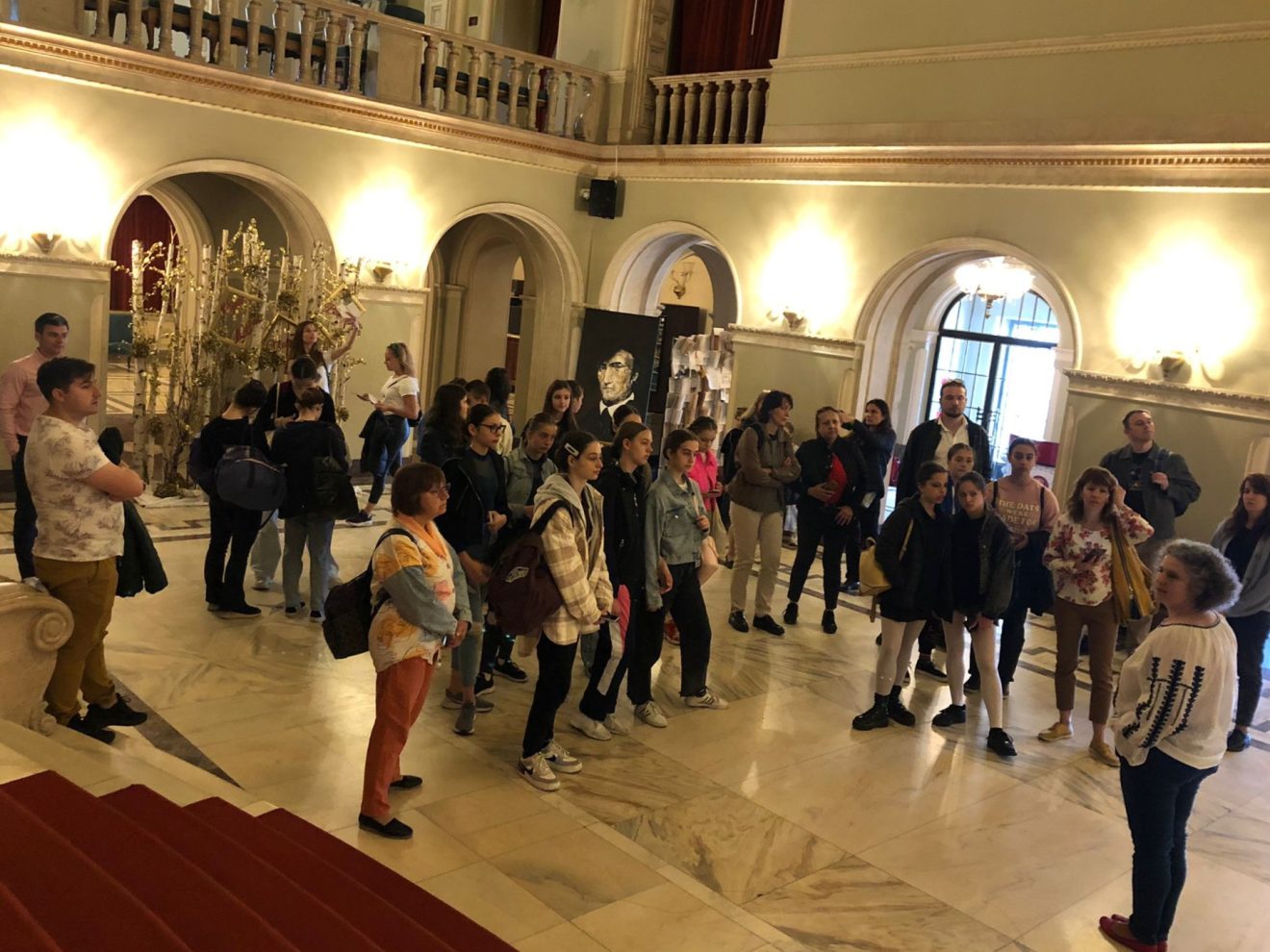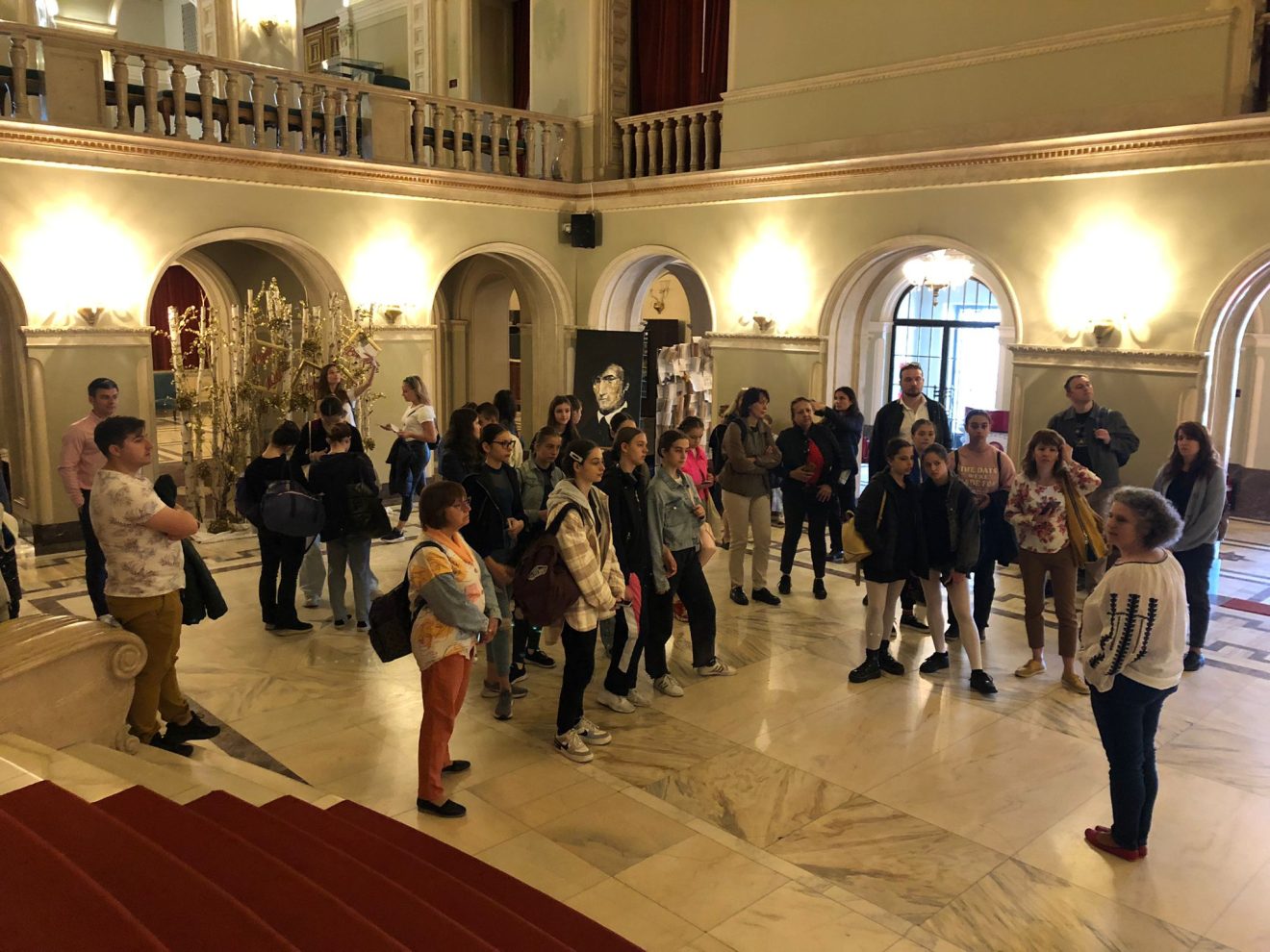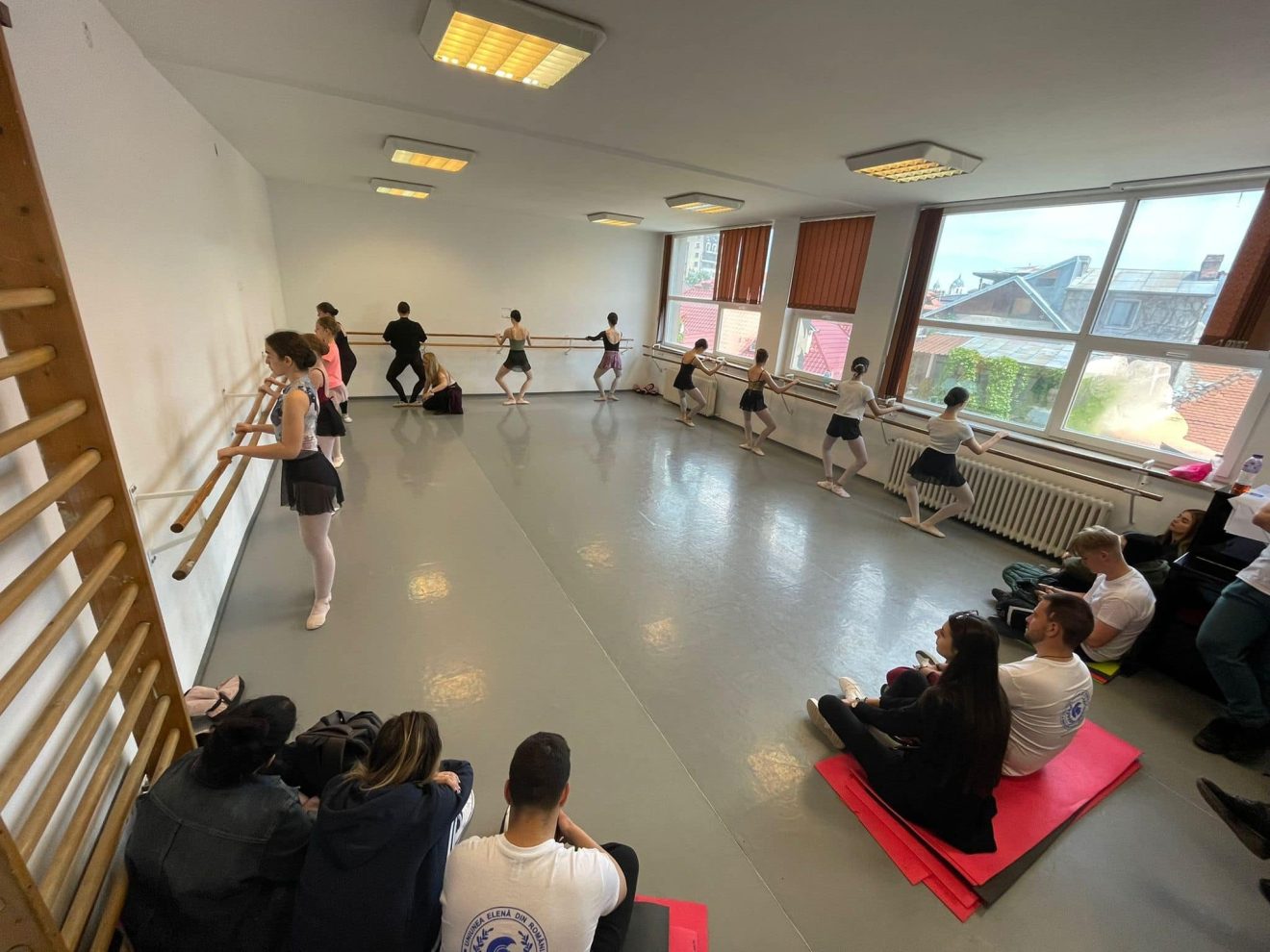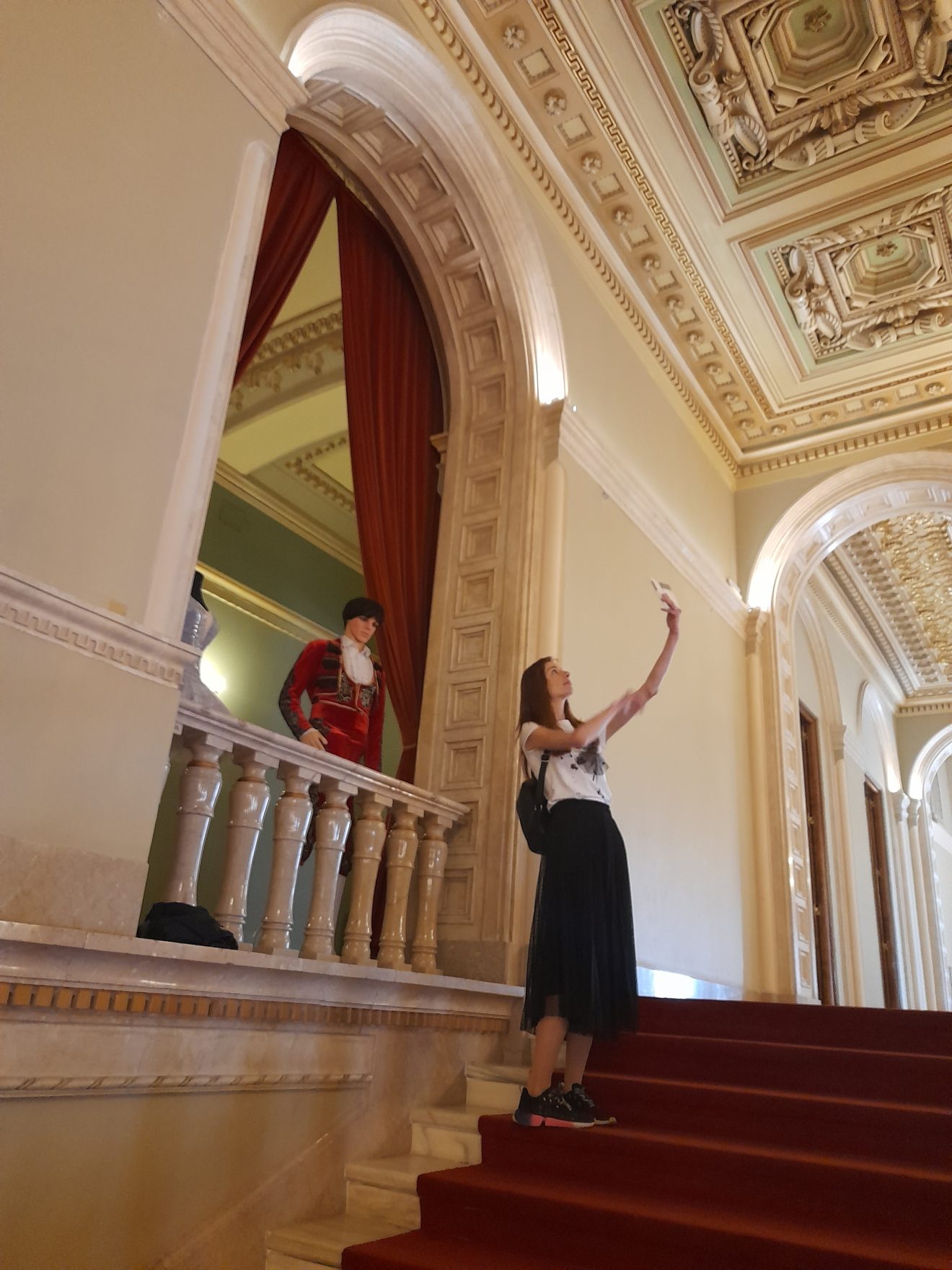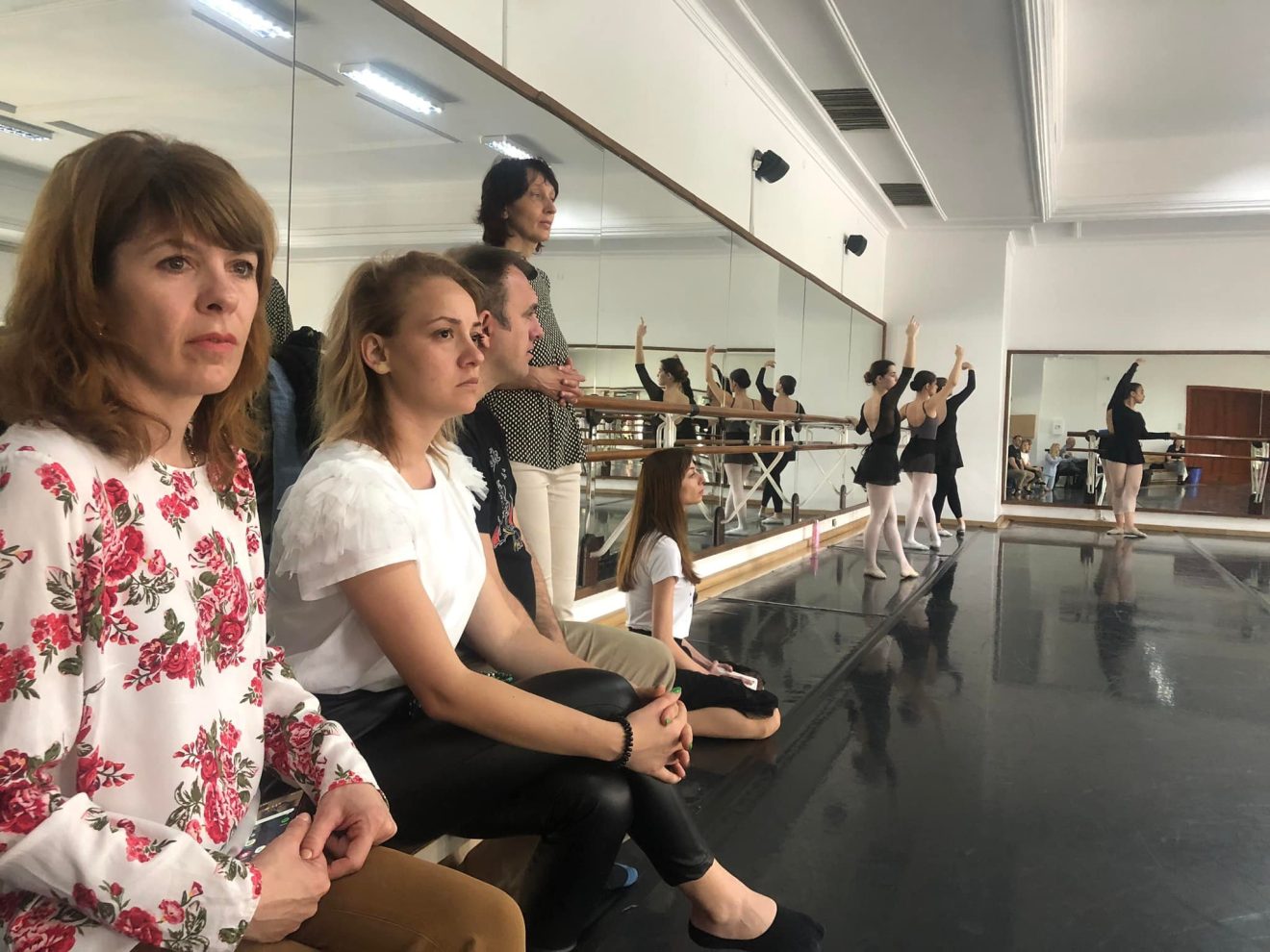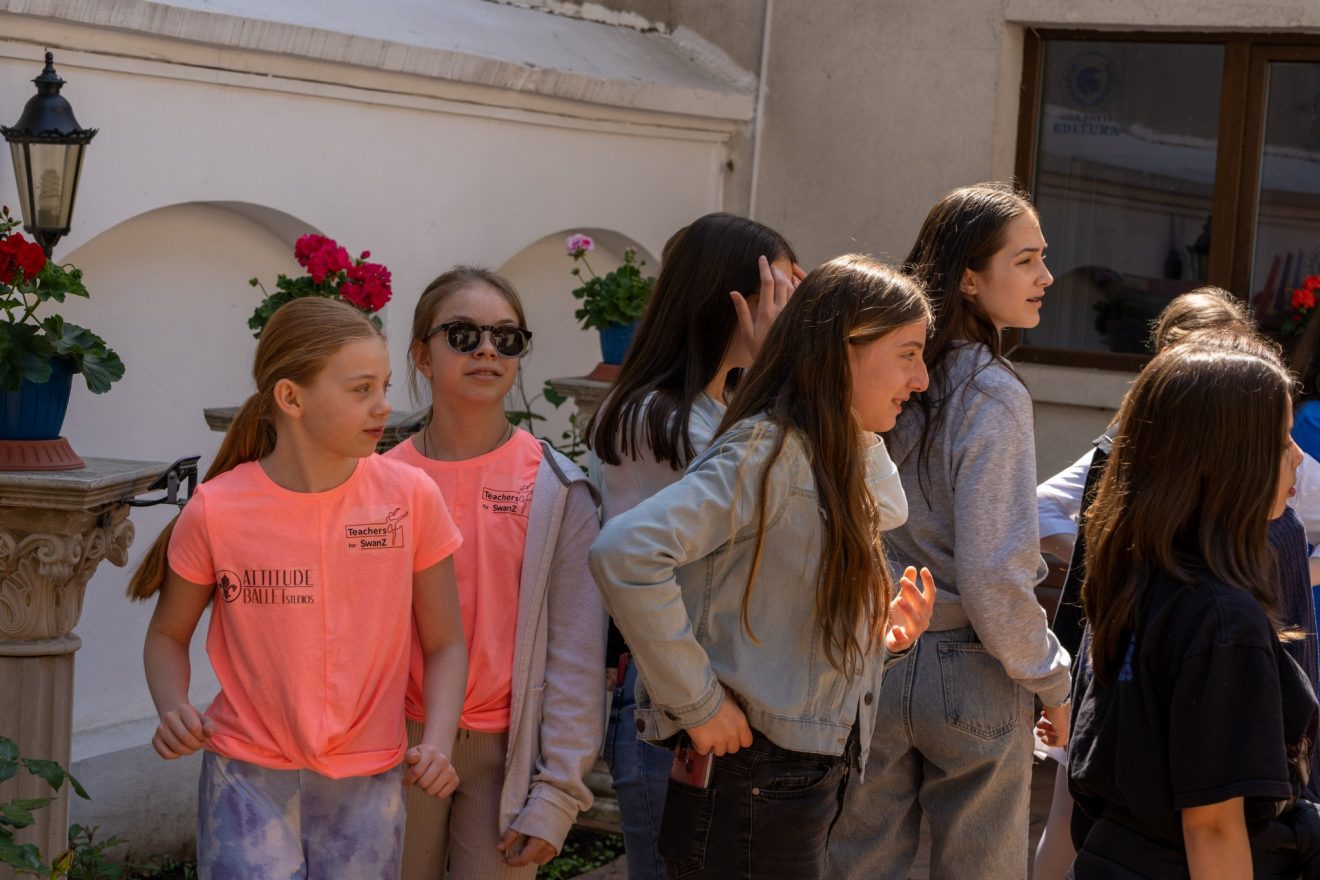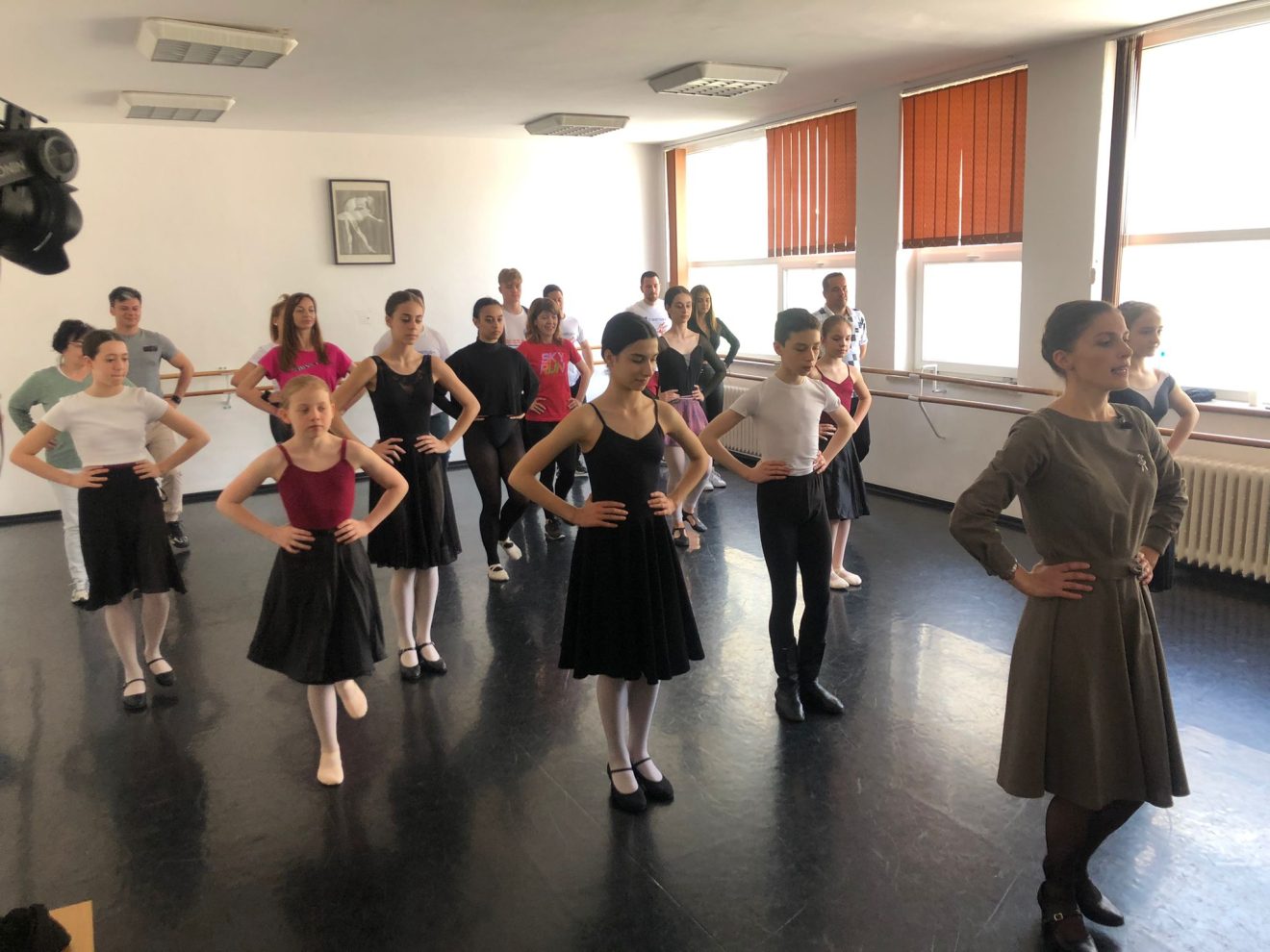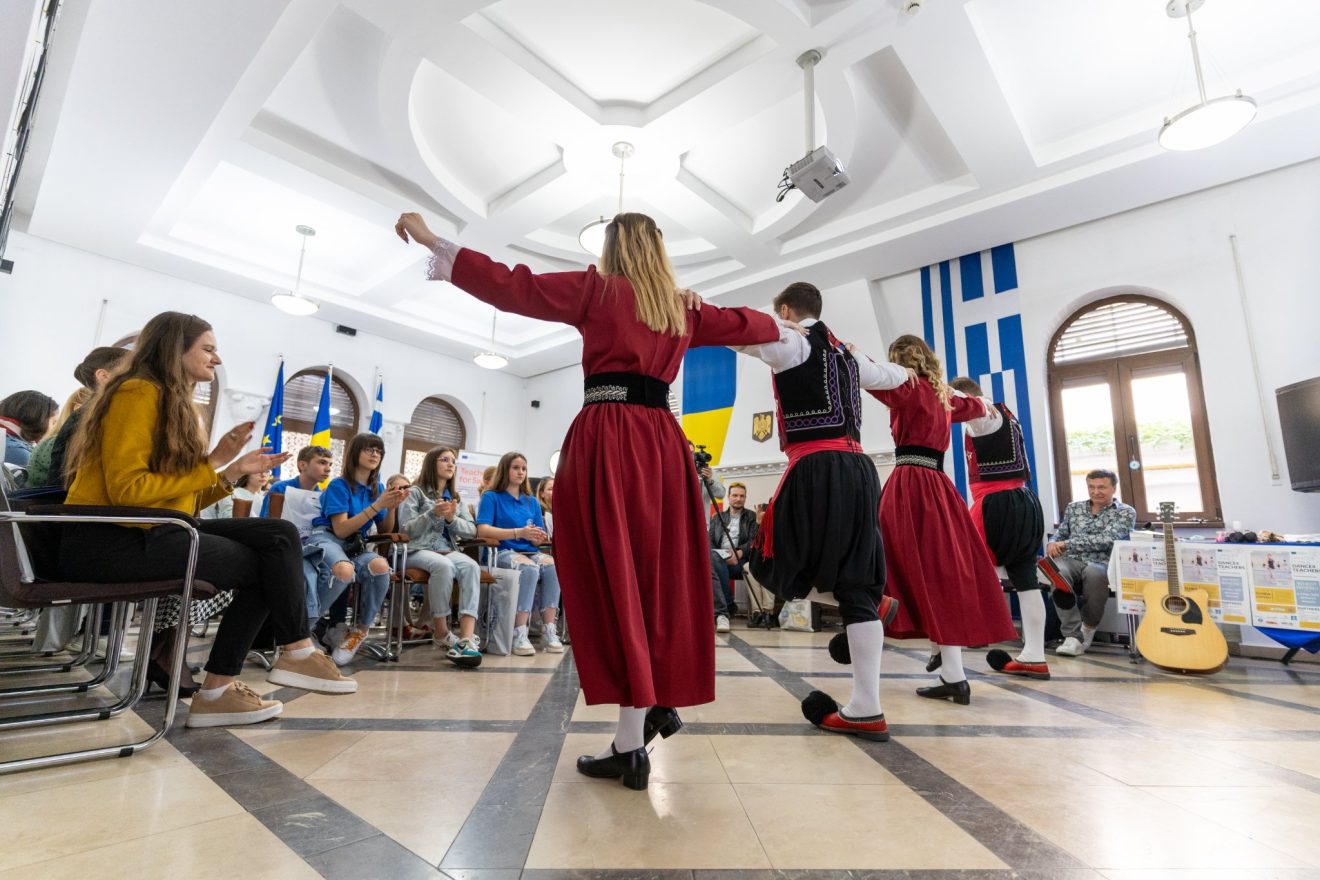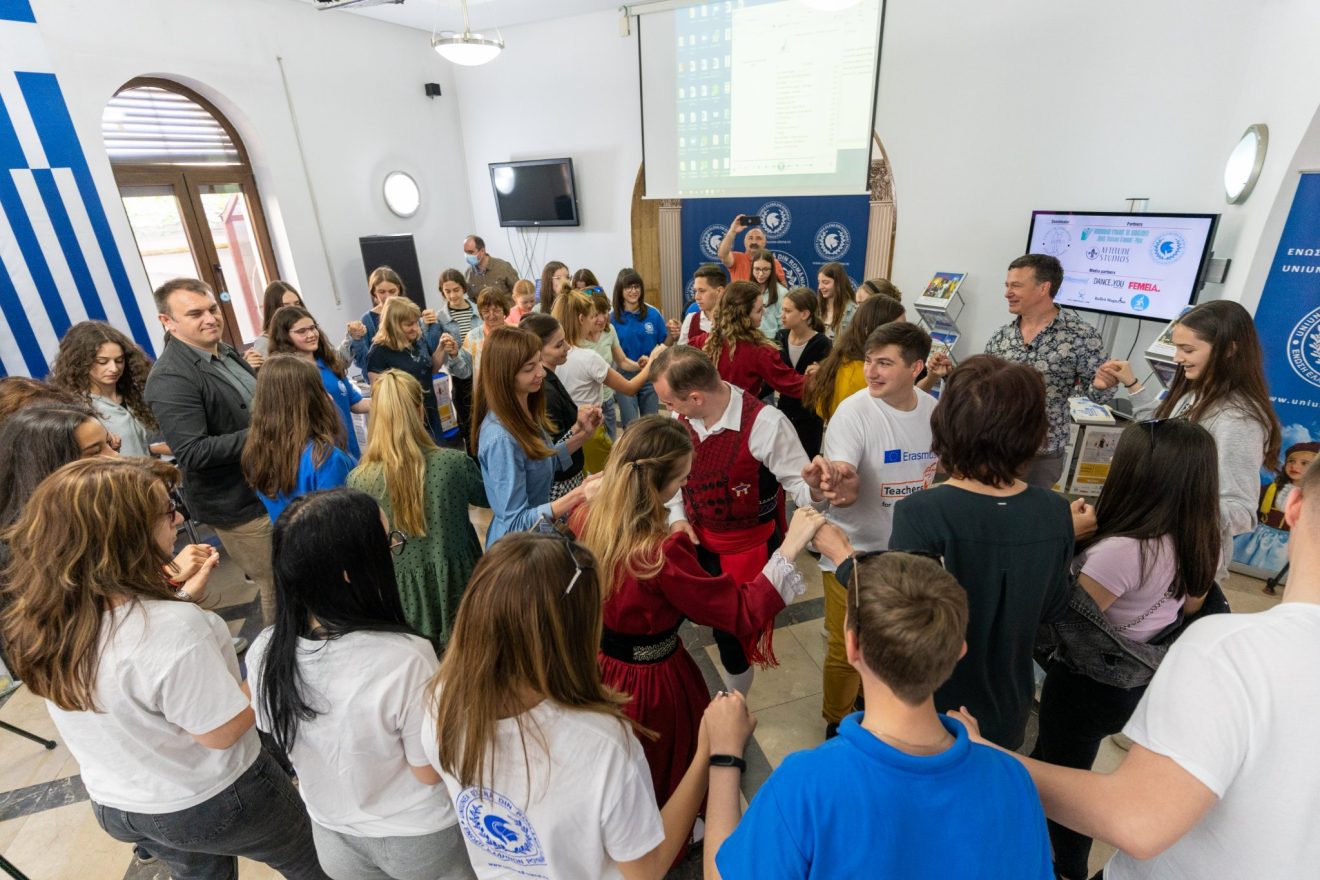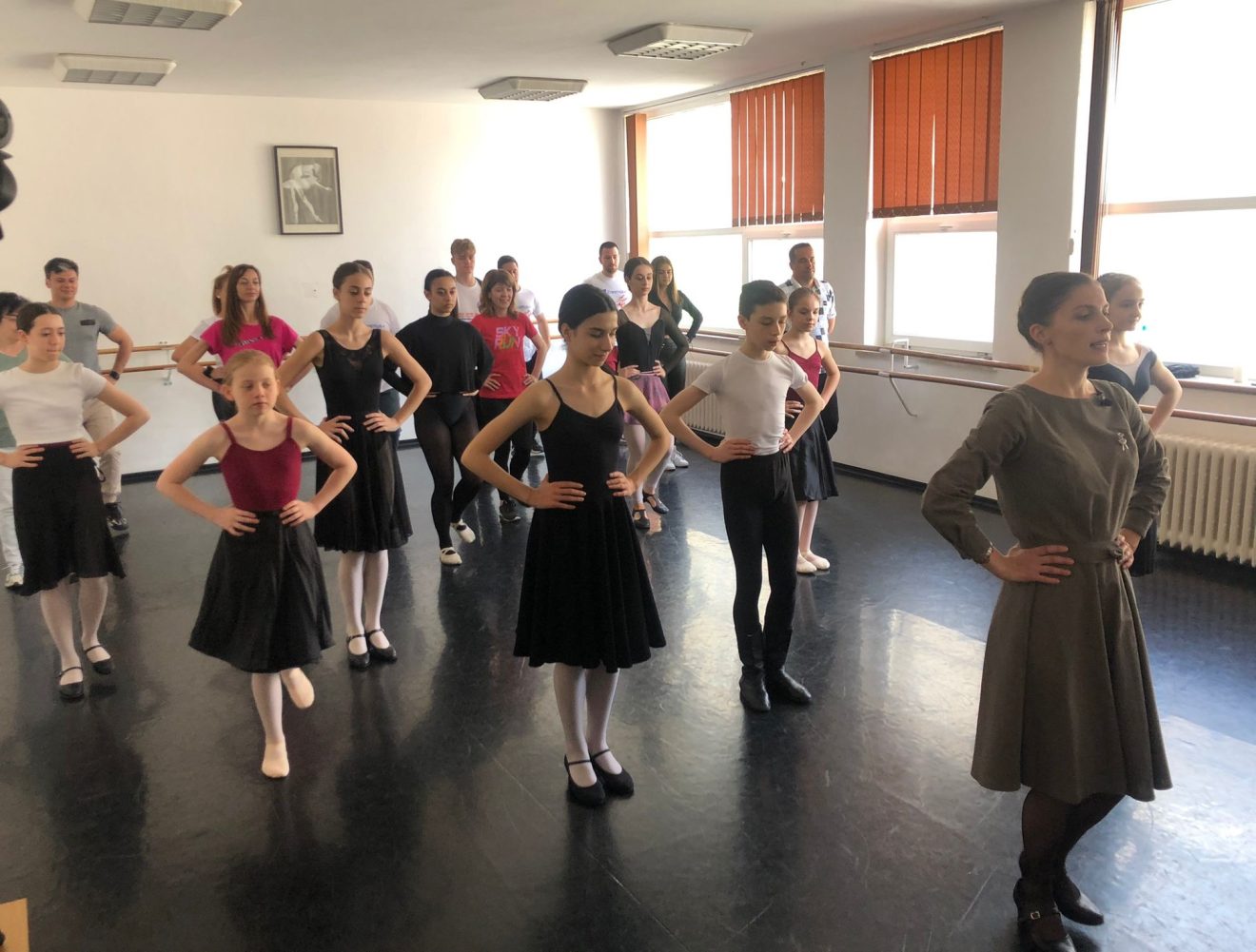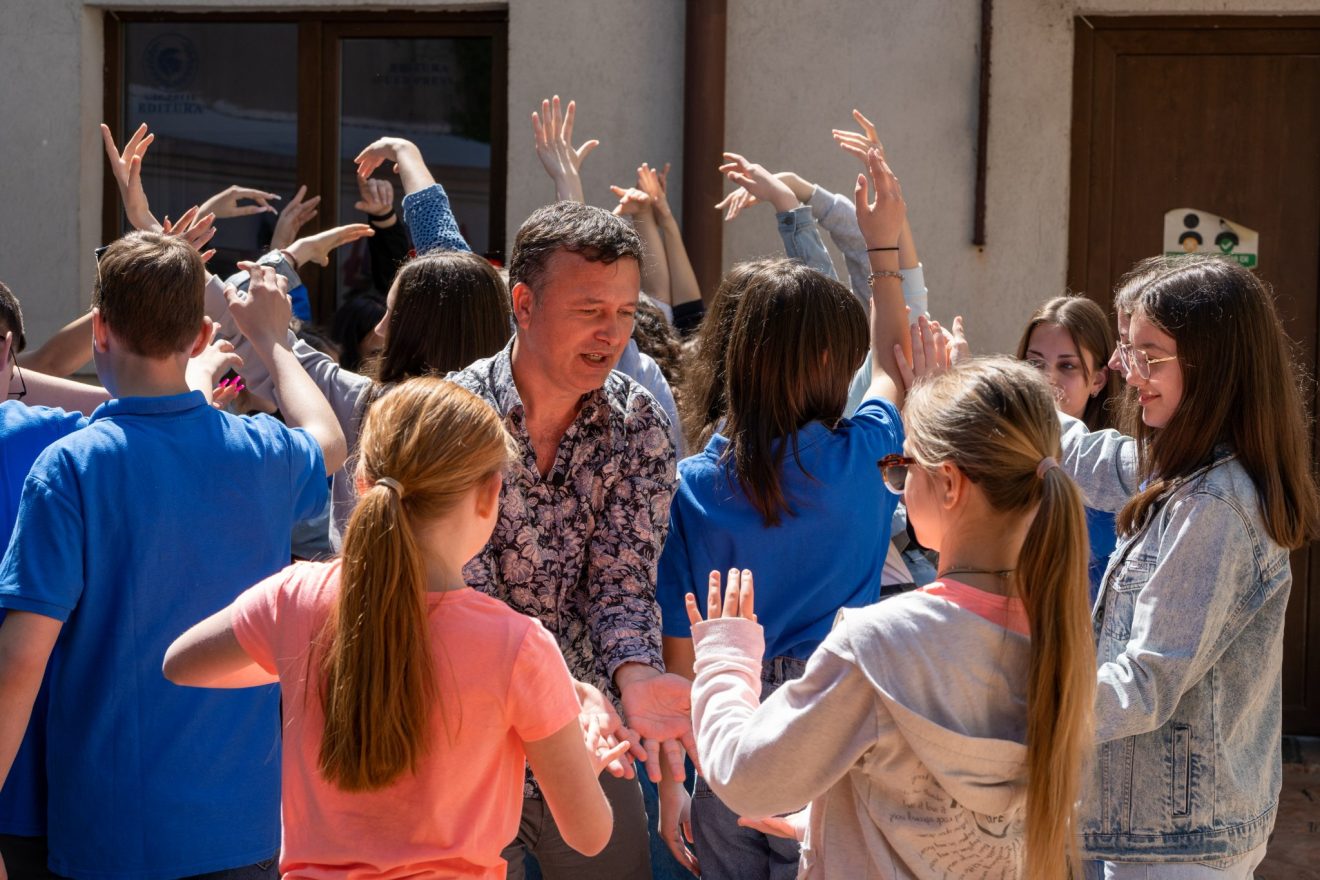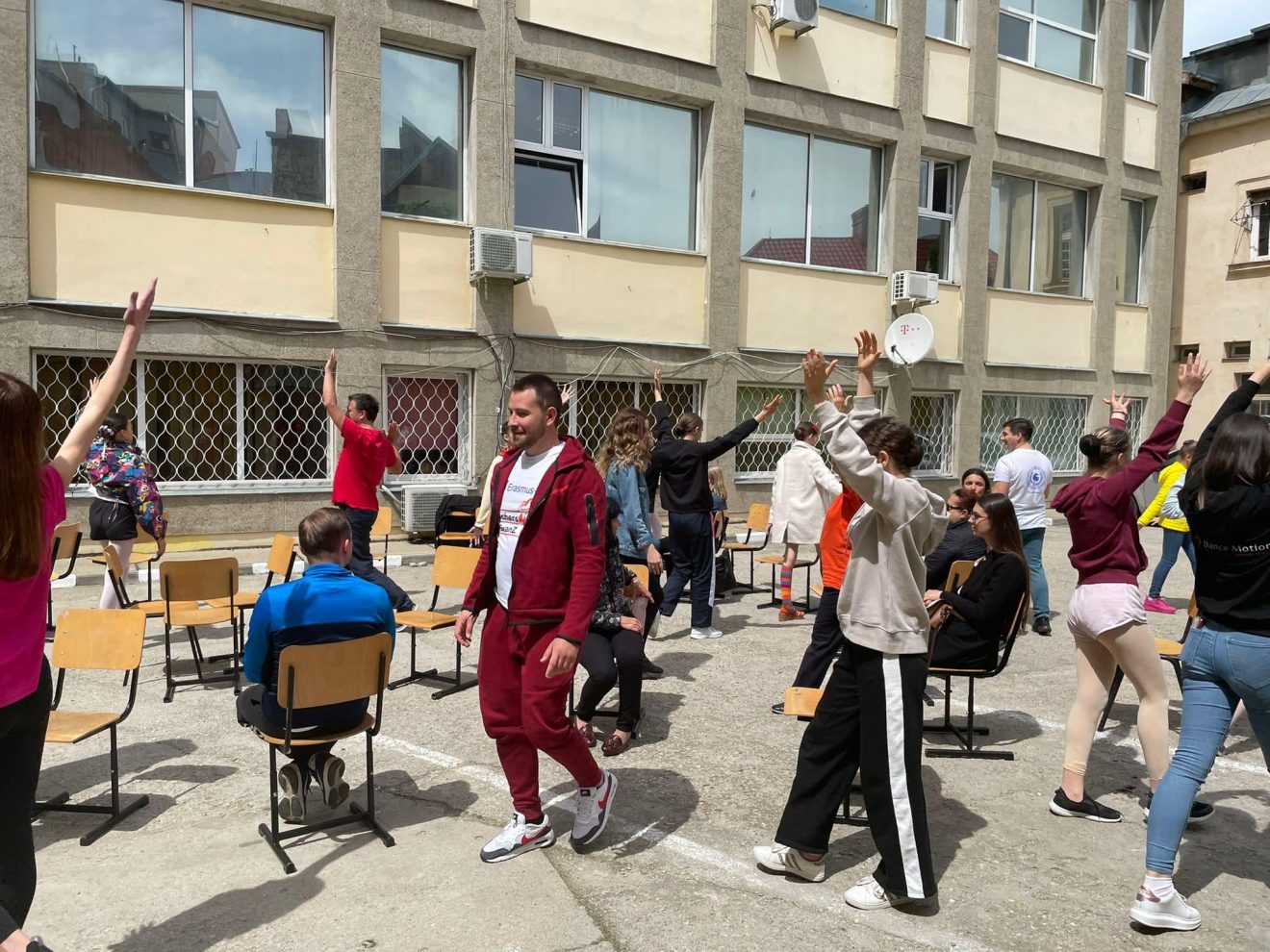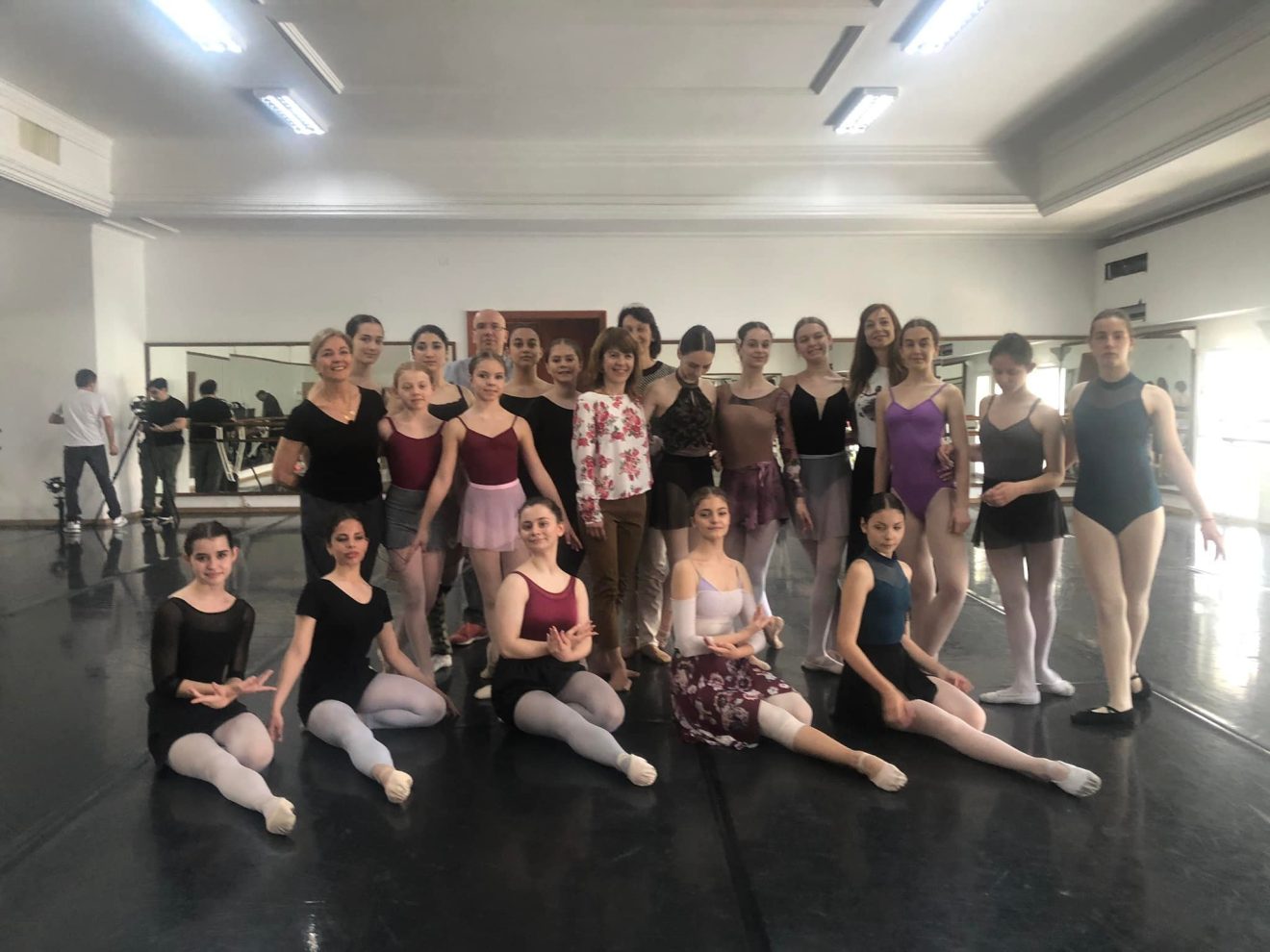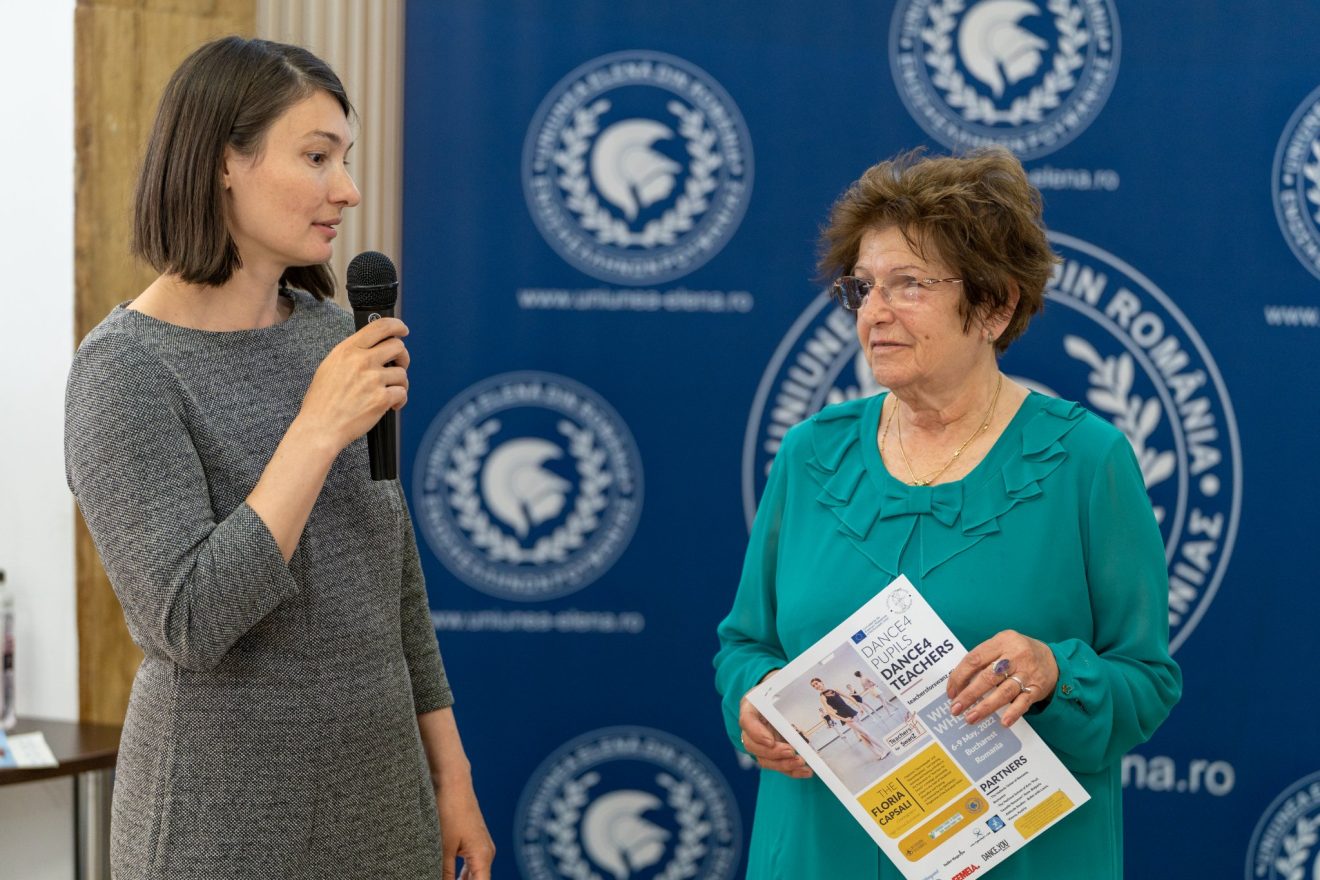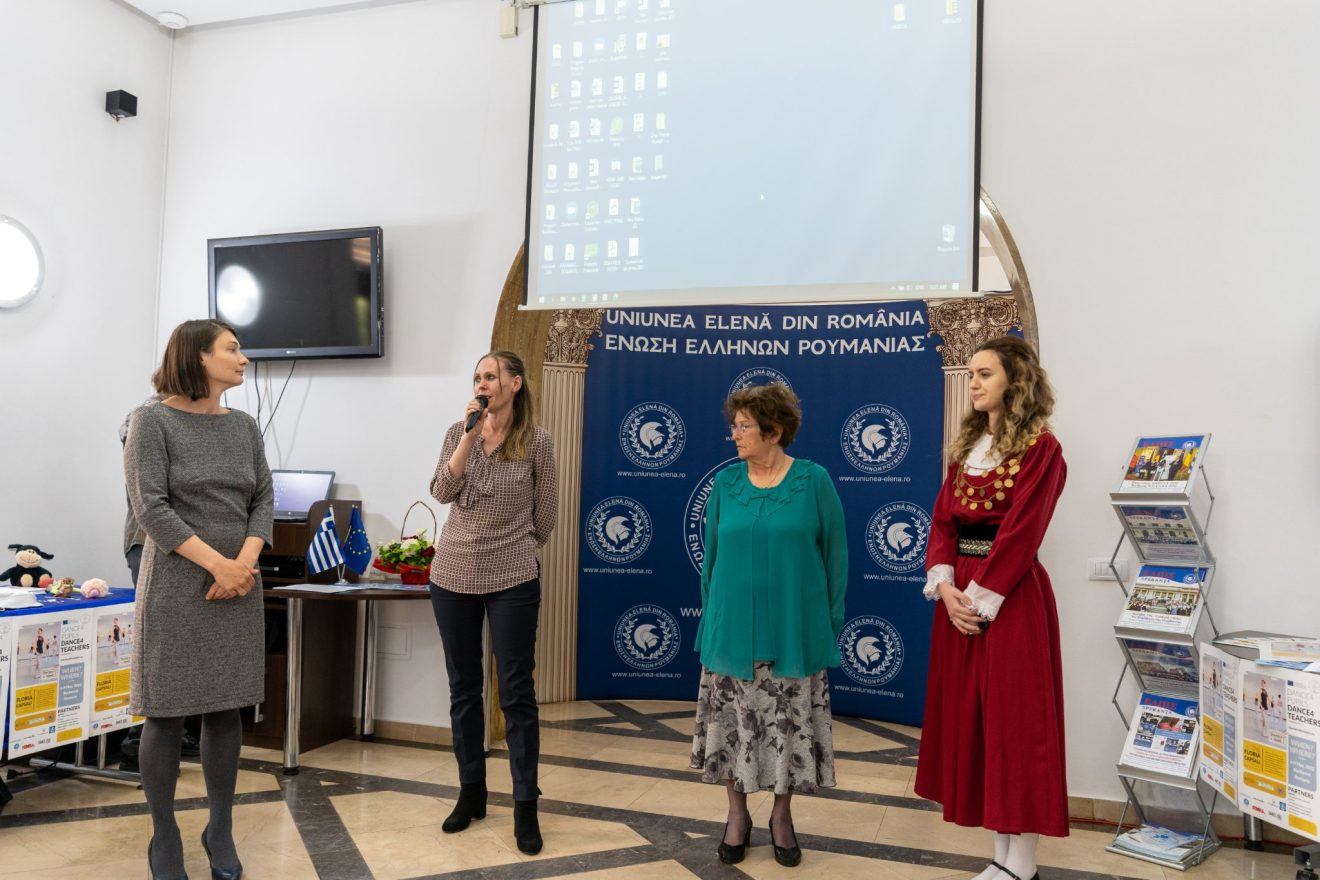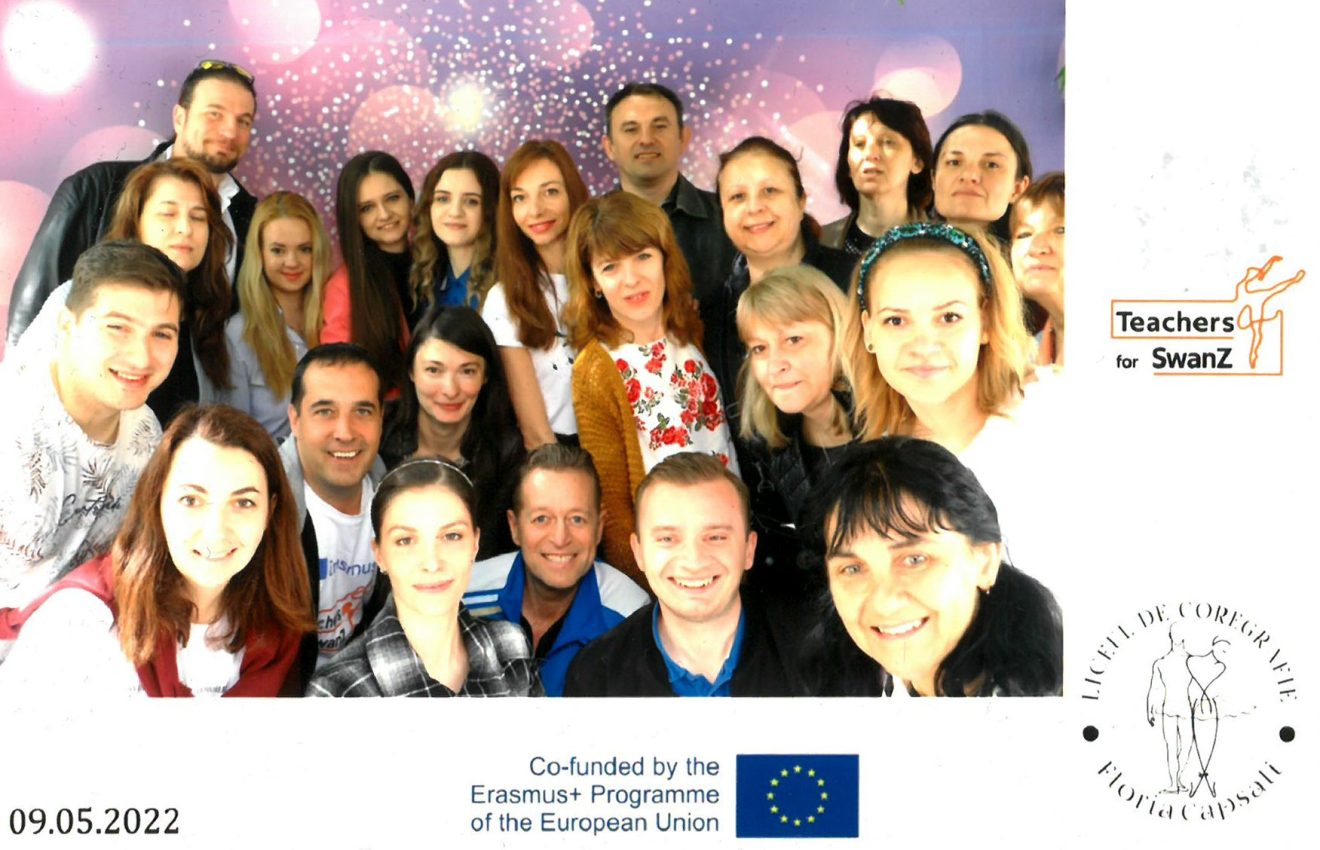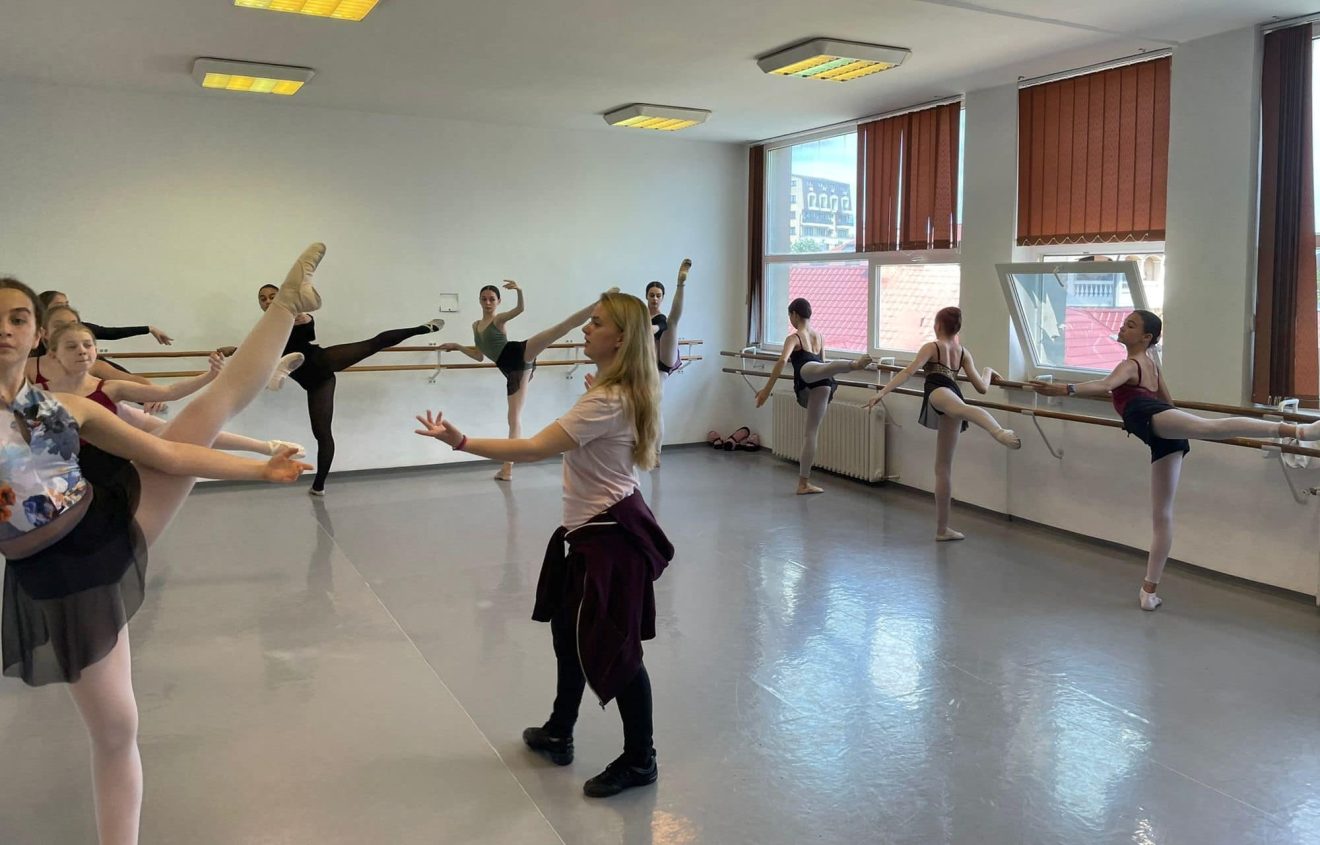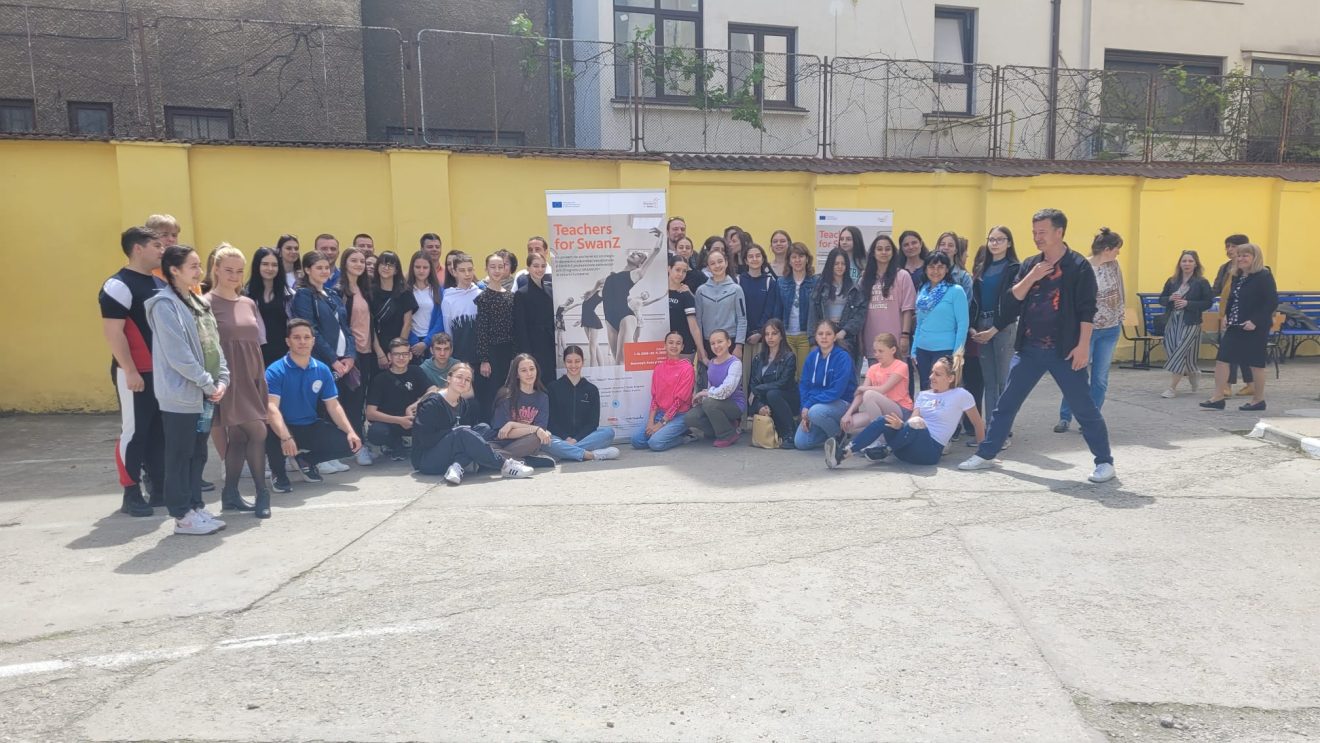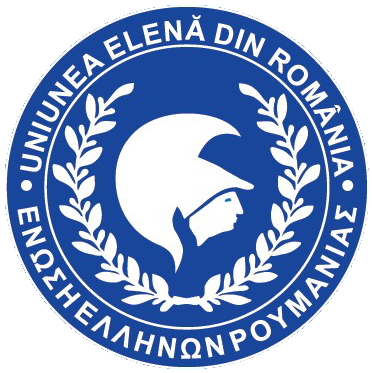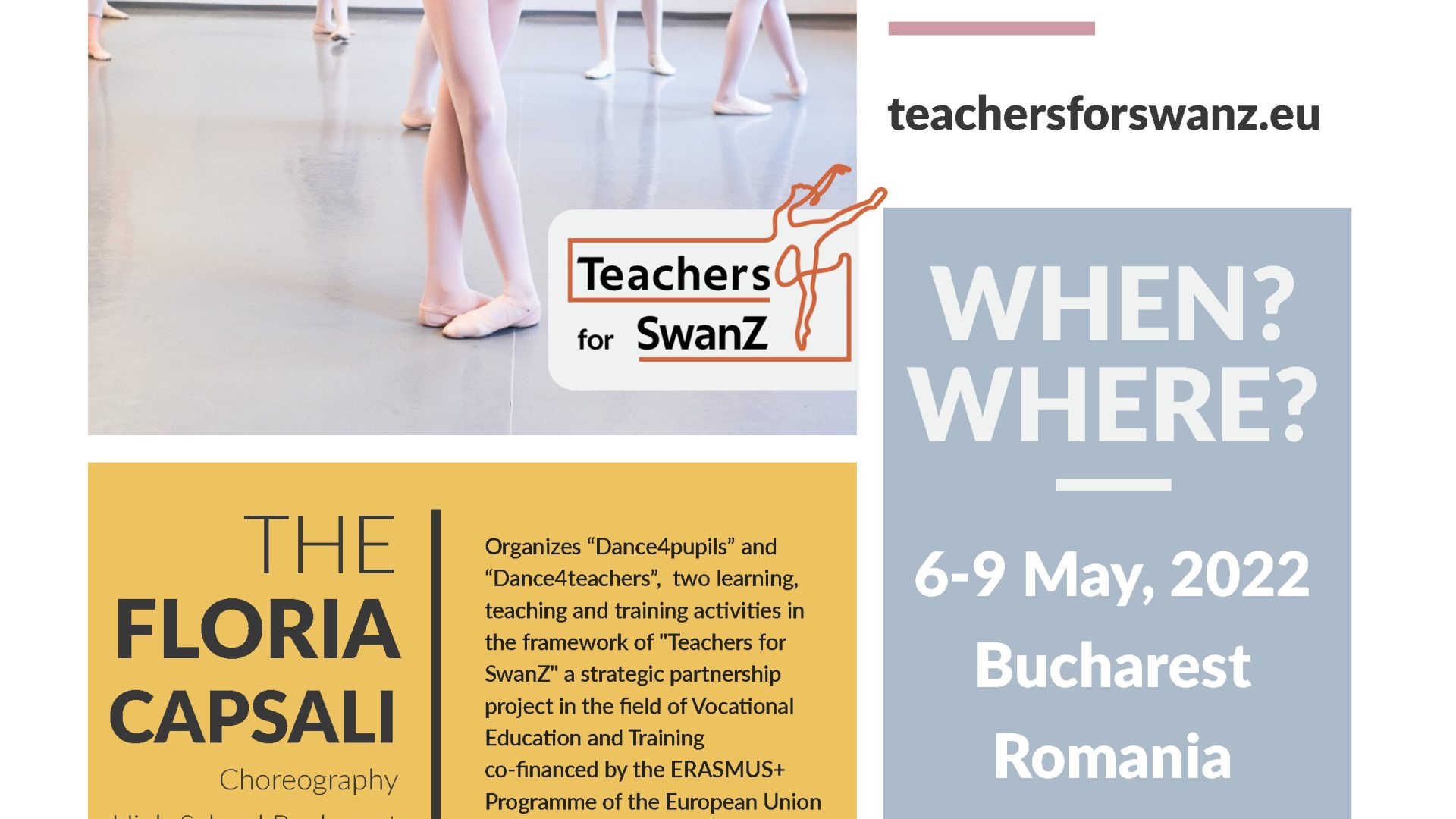“Dance4pupils&teachers”
Care credeți că este cel mai așteptat moment într-un proiect la care participă patru parteneri din trei țări diferite, după un an și ceva de activități desfășurate pe Zoom? Exact, este mult visatul moment în care ne vedem fizic pentru prima dată, lucrăm împreună, ne exprimăm gândurile, râdem, ne înțelegem din priviri, ne căutăm cuvintele care parcă fac parte dintr-un vocabular universal, ne bucurăm să fim unii lângă alții. Ne simțim bine, de parcă ne-am cunoaște de mult.
Așa a fost și la prima întâlnire față în față a profesorilor, instructorilor și elevilor din școlile de dans și coregrafie implicate în proiectul Teachers for SwanZ, o inițiativă cofinanțată prin programul Erasmus+ al Uniunii Europene. Grupuri de elevi și profesori sau instructori de dans din România, Austria și Bulgaria s-au reunit la București, în perioada 6 – 9 mai a.c., gazdă fiind inițiatorul și coordonatorul proiectului – Liceul de Coregrafie Floria Capsali.
Au participat toate entitățile partenere în proiect – liceul amintit și Uniunea Elenă din România, Școala Națională de Arte Prof. Vesselin Stoyanov din Ruse, Bulgaria, și Attitude Studios din Viena, Austria, în total peste 30 elevi și circa 20 profesori, activitățile desfășurându-se în diferite locații. Programul a cuprins două sesiuni distincte – un training pentru profesori, intitulat Dance4teachers, și unul pentru elevi, intitulat Dance4pupils. Principalii protagoniști au fost cadre didactice din Liceul Floria Capsali, lectori invitați din lumea dansului, instructori de dans, traineri profesioniști. Dar este de subliniat că, direct sau indirect, toate activitățile profesorilor au vizat o mai bună și mai actuală pregătire de specialitate a elevilor, o mai bună comunicare, pregătire pentru scenă, capacitate de empatie și dialog, astfel încât ei să fie pregătiți în anii viitori pentru a se integra în lumea artistică și pentru performanță.
Trecând în revistă momentele celor patru zile de pregătire intensivă, avem imaginea unui puzzle inedit: elementul predominant a fost, așa cum era și firesc, dansul – de la cel tradițional la dansul de caracter, de la balet la dansul contemporan, mai exact tipurile de dans care se predau și se învață în școlile de profil. Lecții deschise de balet au susținut profesoarele Mihaela Vasilovici de la Liceul Floria Capsali, care a prezentat studii de balet, nivel avansat, exerciții la bară și la centru, sărituri, precum și Laura Cristinoiu de la Attitude Studios, care a prezentattehnica piruetei și exerciții suport pentru turații; dansul de caracter a fost prezentat și exersat împreună cu prof. Mădălina Mechenici de la Liceul Floria Capsali, moment inedit pentru colegii bulgari, care nu predau această disciplină în programul școlii. Raluca Mălăeru, profesoară de balet la același liceu, a susținut o oră de balet cu profesorii care predau alte materii în școlile de dans și care nu au mai exersat baletul niciodată. Cu copiii a realizat un alt moment de balet, pe o muzică mai puțin utilizată, iar elevii au fost provocați să se adapteze unui stil muzical diferit.
Modulul de dans tradițional românesc a fost susținut de profesorii Simona Paraschivu și Claudiu Staicu de la liceul – gazdă, iar dansul contemporan a fost prezentat și exersat împreună cu prof. Simona Paraschivu. Echipa bulgară și cea a Uniunii Elene din România s-au implicat cu multă deschidere în modulul de dans tradițional, exersând împreună un dans din Maramureș, dansuri bulgărești și grecești.
Cunoscutul dansator, coregraf, expert cultural și manager de organizații culturale Cosmin Manolescu i-a invitat pe toți participanții la câteva sesiuni de regândire a dansului și de descoperire a unor noi strategii de predare în această eră marcată de pandemie și război. Exercițiile coordonate de Cosmin Manolescu s-au desfășurat în spații închise și deschise, promovând un stil liber, modern, apropiat de natură. Exercițiile au adus împreună elevi, profesori de dans, profesori de alte materii, ceea ce a dus la crearea unor momente de dans inedite și foarte gustate de către cei prezenți.
Extrem de interesante și apreciate au fost și sesiunile de training pe teme conexe predării artei dansului, teme care întregesc puzzle-ul și vin în completarea formării pe care elevii o dobândesc la școală. Este vorba despre perfecționarea profesorilor pe teme de comunicare, dialog între limbi și culturi, exersarea abilităților de coaching și soft skills, astfel încât să fie extinse și diversificate, într-un spirit modern, metodele de lucru cu copiii la clasă și în afara clasei.
Valentin Dițulescu, trainer la școala de actorie Go!Bananas, a propus profesorilor exerciții interactive axate în special pe teme de comunicare, leadership, legătura dintre minte și corp, controlul emoțiilor, conceperea unor jocuri care pot fi folosite în clasă.
Francesca Dogaru, actriță, activist social, coaching trainer la World Wilde Fund, a susținut un modul despre comunicare, relațiile cu ceilalți, cum să ne înțelegem pe noi înșine, limbajul emoțiilor și al gesturilor, finalizat cu un moment de dans, prin care copiii au ilustrat cele discutate.
Un atelier de actorie cu elevii și profesorii, intitulat My gift to the world, a fost susținut de Monica Săndulescu, actriță și formator în cadrul Attitude Studios. Temele abordate prin exerciții interactive au fost cunoașterea propriului corp, acceptarea și aprecierea față de sine, încrederea care trebuie să existe între parteneri în cadrul echipei aflate în clasă sau pe scenă, ilustrată prin momente de improvizație – creații proprii ale unor grupuri de câte doi elevi.
Cătălina Lupu, trainer, a propus un exercițiu bazat pe relația inversată profesor – elev, pentru a dezbate conceptul de cultură a demnității și a arăta cum pot fi depășite emoțiile negative, cum poate fi cultivată stima de sine. Au rezultat un set de desene și trei momente de dans, în grupuri de câte 2 copii, care au improvizat și au creat propria coregrafie.
Profesorii au luat parte și la un atelier axat pe promovarea cunoașterii și dialogului între etnii, limbi și culturi, ca element esențial al educației pentru cetățenie democratică în societatea actuală. Element care nu poate lipsi din pregătirea artiștilor care vor urca în curând pe scenele lumii, în viziunea lectorului – Rodica Precupețu, formator în echipa Liceului Floria Capsali. Un exemplu de bună practică pe această temă a fost realizat de echipa Uniunii Elene din România, care a creat o prezentare PPT despre dimensiunea multiculturală a orașului Ploiești.
Dacă momentul de start s-a desfășurat la sediul Uniunii Elene din România, unde Olimpia Bândea, secretar general al organizației, a vorbit despre activitatea gazdelor, iar echipele de instructori și elevi au prezentat câteva dansuri grecești, momentul de final s-a petrecut la Opera Națională din București, o instituție prestigioasă cu o istorie de peste 100 de ani. A fost un prilej pentru toate echipele, profesori și elevi, să exprime câteva gânduri la finalul celor patru zile de pregătire, iar pentru organizatori să facă o evaluare la cald a activității. Prof. Mădălina Giurgescu, directorul Liceului Floria Capsali, și prof. Diana Zăvălaș, managerul proiectului, au adunat o colecție frumoasă de aprecieri și de propuneri pentru viitor.
Pe parcursul șederii lor la București, participanții au vizitat Palatul Parlamentului, cu sprijinul domnului deputat Dragoș Gabriel Zisopol, președintele Uniunii Elene din România, și au vizionat trei spectacole – unul de dans românesc, la Palatul Copiilor, unul de balet la Centrul Cultural Ion Manu din Otopeni și unul de dans contemporan la Centrul Național al Dansului București. Din evaluările participanților și nerăbdarea cu care copiii așteaptă să se întâlnească din nou la sesiunile de training viitoare, care vor avea loc la Ruse, în Bulgaria, putem trage concluzia că evenimentul de la București a fost o reușită. Proiectul Teachers for SwanZ merge mai departe.
“Dance4pupils&teachers”
What do you think is the most awaited moment in a project in which four partners from three different countries participate, after more than a year of activities carried out on Zoom? Exactly, it is the long-dreamed moment when we see each other physically for the first time, we work together, we express our thoughts, we laugh, we understand each other by exchanging looks, we search for the words that seem to be part of an universal vocabulary, we are glad to be next to each other. We feel good, as if we have known each other for a long time.
This was the case at the first face-to-face meeting of teachers, instructors and pupils from dance and choreography schools involved in the Teachers for SwanZ project, an initiative co-financed by the Erasmus+ Program of the European Union. Groups of pupils and teachers or dance instructors from Romania, Austria and Bulgaria gathered in Bucharest, between 6th and 9th of May. The host was the project initiator and coordinator – the Choreography High School Floria Capsali.
All the partner entities in the project participated – the aforementioned high school and the Hellenic Union of Romania, the National School of Arts Prof. Vesselin Stoyanov from Rousse, Bulgaria, and Attitude Studios from Vienna, Austria, a total of over 30 students and about 20 teachers. The activities took place in different locations. The program included two distinct sessions – a training for teachers, entitled Dance4teachers, and one for students, entitled Dance4pupils. The main protagonists were teachers from the Floria Capsali High School, invited lecturers from the dance world, dance instructors, professional trainers. But it is worth pointing out that, directly or indirectly, all the teachers’ activities were aimed at a better and modern specialized training of the students, a better communication, preparation for performing on stage, an increased capacity for empathy and dialogue, so that they are prepared in the coming years to integrate into the artistic world, to achieve performance.
Reviewing the moments of the four days intensive training, we have the image of a unique puzzle: dance was the predominant element, as it was natural – from the traditional one to the character dance, from ballet to contemporary dance, more precisely the types of dance that are taught and learned in the specialized schools. Open ballet lessons were held by teachers Mihaela Vasilovici from the Floria Capsali High School, who presented ballet studies for advanced level, barre and center exercises, jump techniques, as well as Laura Cristinoiu from Attitude Studios, who presentedthe pirouette techniques and support exercises for revs; the character dance was presented and practiced together with the teacher Mădălina Mechenici from Floria Capsali High School, a unique moment for the Bulgarian colleagues, who do not teach this subject in the school program. Raluca Mălăeru, a ballet teacher at the same high school, held a ballet class with teachers who teach other subjects in dance schools and who have never practiced ballet before. With the children she made another ballet moment, on unusual music, and the students were challenged to adapt to a different musical style.
The traditional Romanian dance module was held by teachers Simona Paraschivu and Claudiu Staicu from the host high school, and contemporary dance was presented and practiced together with Simona Paraschivu. The Bulgarian team and that of the Hellenic Union of Romania were involved with great openness in the traditional dance module, practicing together a dance from Maramures, Bulgarian and Greek dances.
The well-known dancer, choreographer, cultural expert and cultural NGOs’ manager Cosmin Manolescu invited all the participants to several sessions of “rethinking the dance” and discovering new teaching strategies in this era marked by the pandemic and war. The exercises coordinated by Cosmin Manolescu took place in indoor and outdoor spaces, promoting a free, modern style, close to nature. The exercises brought together students, dance teachers and “non-dance” teachers, which led to the creation of unique dance moments, very much appreciated by the participants.
Extremely interesting and appreciated were the training sessions on topics that are connected to the dance teaching, topics that complete the puzzle and complement the training that students acquire at school. It is about training teachers on communication topics, dialogue between languages and cultures, practicing coaching skills and soft skills, so that the methods of working with children in the classroom and outside the classroom are extended and diversified, in a modern spirit.
Valentin Dițulescu, trainer at the acting school Go! Bananas, proposed to the teachers interactive exercises focused on the topics of communication, leadership, connection between mind and body, the control of emotions, the design of games that can be used in the classroom.
Francesca Dogaru, actress, social activist, coaching trainer at the World Wilde Fund, held a module about communication, relationships with others, how to understand ourselves, the language of emotions and gestures, ending with a dance moment through which the children illustrated the topic.
An acting workshop with students and teachers, entitled My gift to the world, was held by Monica Săndulescu, actress and trainer at Attitude Studios. The topics approached through interactive exercises were knowing one’s own body, accepting and appreciating oneself, the trust that must exist between the partners within the team, in class or on stage, illustrated by moments of improvisation – own creations of groups of two students.
Cătălina Lupu, trainer, proposed exercises based on the inverted teacher-student relationship, in order to debate the concept of a culture of dignity and to show how negative emotions can be overcome, how self-esteem can be cultivated. The result was a set of drawings and three dance moments, in groups of two children, who improvised and created their own choreography.
Teachers also took part in a workshop focused on promoting knowledge and dialogue between ethnic groups, languages and cultures, as an essential element of education for democratic citizenship in today’s society. Element that cannot be missing from the training of the artists who will soon dance on the world stages, in the vision of the lecturer – Rodica Precupețu, trainer in the team of the Floria Capsali High School. An example of good practice on this topic was made by the team of the Hellenic Union of Romania, who created a PPT presentation about the multicultural dimension of Ploiesti town.
If the start moment took place at the headquarters of the Hellenic Union of Romania, where Olimpia Bândea, secretary general of the organization, spoke about the activity of the hosts and a group of instructors and students presented Greek dances, the final moment took place at the National Opera in Bucharest, a prestigious institution with a history of over 100 years. At the end, it was an opportunity for all the teams, teachers and students, to express some thoughts on the four training days, and for the organizers to make an evaluation of the activity. The teachers Mădălina Giurgescu, the principal of the Floria Capsali High School, and Diana Zăvălaș, the project manager, gathered a beautiful collection of appreciations and proposals for the future.
During their stay in Bucharest, the participants visited the Palace of Parliament, with the support of MP Dragoș Gabriel Zisopol, president of the Hellenic Union of Romania, and watched three performances – one of Romanian dance, at the Children’s Palace, one of ballet at the Ion Manu Cultural Center in Otopeni and one of contemporary dance at the National Dance Center of Bucharest.
From the evaluations of the participants and the impatience with which the children are waiting to meet again at the future training sessions, which will take place in Rousse, Bulgaria, we can conclude that the event in Bucharest was successful. The Teachers for SwanZ project goes further.
